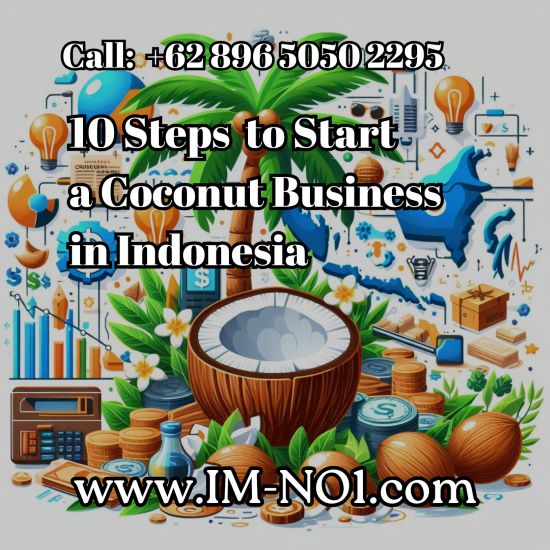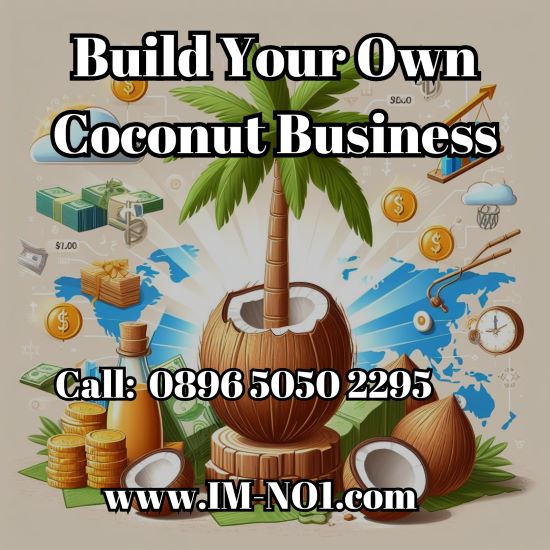10 steps on how to build a thriving coconut business in Indonesia into reality. Easily and affordably.Setting your business for global export dominance.
Table of Contents
How Big is The Coconut Business in Indonesia?
Indonesia is the largest producer and exporter of coconut and its derivative products in the world. The country has a vast area of coconut plantations that stretch across all the big and small islands. The best quality coconuts can be easily found on many islands in Indonesia, such as Java, Sumatera, Sulawesi, Ambon and others.
For foreigners who understand this business, it’s a great opportunity for anyone who can master the distribution channels of coconut trade. The distribution channels start from the farmers, small collectors, large collectors of coconut for sale in the domestic market. Meanwhile, for the export market, it requires more careful research, because coconut is a very valuable commodity that can produce hundreds of derivative products worth hundreds of millions of dollars, which are not realized by many people.
In this blog post, I will share some ideas on how to build a coconut business in Indonesia, from choosing the production location that is close to the raw materials, preparing the necessary production equipment, preparing the required workforce, storage, packaging, transportation and so on.
Is Coconut Business Profitable?
According to the The Observatory of Economic Complexity (OEC), Indonesia exported $471 million worth of fresh or dried coconuts in 2021. The main destinations of Indonesia’s exports were China, Malaysia, Thailand, Germany and Singapore. Indonesia also exported other coconut products, such as coconut oil, coconut sugar, coconut milk, coconut water, coconut charcoal, coconut fiber and coconut husk.
The coconut business in Indonesia is dominated by smallholder farmers, who own about 95% of the total coconut area. However, the industry faces many challenges, such as low productivity, low investment, lack of access to markets, aging trees and farmers, and competition from palm oil. Therefore, there is a need to revitalize the coconut sector and increase its value-added potential.
How to Make Money From Coconut Business in Indonesia?
There are many ways to make money from coconut business in Indonesia, depending on the type of product, the target market and the level of processing. Here are some examples of coconut business ideas that you can consider:
Contact us today and let us show you how we can help you succeed in the coconut business industry and its derivatives products from A to Z.
1. Coconut Oil Industry
Coconut oil is one of the most popular and versatile coconut products, as it can be used for cooking, cosmetics, health and industrial purposes. There are two types of coconut oil industry: virgin coconut oil (VCO) and refined, bleached and deodorized (RBD) coconut oil.
VCO is extracted from fresh coconut meat using cold-pressing or fermentation methods, while RBD coconut oil is extracted from dried copra using chemical solvents and high temperature. VCO has a higher value and quality than RBD coconut oil, as it retains the natural aroma, flavor and nutrients of coconut. However, VCO also requires more careful handling and storage, as it is more prone to oxidation and rancidity.
To start a coconut oil business, you will need to source fresh or dried coconuts from the farmers or collectors, invest in the extraction equipment, obtain the necessary permits and certifications, and find the buyers or distributors for your product. You can also create your own brand and market your product online.
2. Coconut Sugar
Coconut sugar is a natural sweetener made from the sap of coconut flower buds. It has a low glycemic index and contains various minerals and antioxidants. Coconut sugar is widely used in Indonesia for cooking and baking, as well as for making beverages and snacks. To start a coconut sugar business, you will need to source the coconut sap from the farmers or collectors, invest in the boiling and crystallization equipment, obtain the necessary permits and certifications, and find the buyers or distributors for your product.
3. Coconut Milk and Water
Coconut milk and water are two popular beverages made from coconut. Coconut milk is the liquid extracted from grated coconut meat, while coconut water is the clear liquid inside young coconuts.
Both coconut milk and water have many health benefits, such as hydrating, nourishing and boosting immunity. Coconut milk and water can be consumed fresh or processed into tetra pak, can, bottle or powder forms – To start this coconut business, you will need to source fresh coconuts from the farmers or collectors, invest in the extraction and packaging equipment, obtain the necessary permits and certifications.
4. Coconut Charcoal Briquettes Business
Coconut charcoal briquettes are made from coconut shells, which are usually discarded as waste. Coconut charcoal briquettes are eco-friendly alternatives to wood charcoal and coal, as they have higher calorific value, longer burning time and lower smoke and ash emissions.
Coconut charcoal briquette can be used for cooking, heating, barbecue and industrial purposes. To doing this business in Indonesia, you will need to source coconut shells from the farmers or wholesale, invest in the carbonization and molding equipment, obtain the necessary permits and certifications.
5. Coconut Fiber and Husk
Coconut fiber and husk are the by-products of coconut processing, which are usually discarded as waste. Coconut fiber and husk have many uses, such as making doormats, brooms, brushes, mattresses, ropes, carpets, geotextiles, biogas, mulch, compost and many more.
To kick off your journey into the Indonesian coconut fiber business, start by gathering coconut waste from diverse sources – be it farmers or coconut collectors transporting their husked coconuts to local markets. Additionally, acquire essential machinery like coconut peeling machines, coir processing units, and cost-effective cleaning equipment suitable for industrial-scale operations. Don’t forget to secure the required licenses and certifications. Let’s get your coconut fiber business up and running smoothly
Remember, this is just the beginning. Stay tuned for the next steps in your coconut business journey! We’ll cover processing, packaging, marketing, and even some island-hopping trade secrets. Let’s turn those coconuts into gold, together!
How to Build Coconut Business in Indonesia:
One of the most important factors for your coconut business success is the location. You will need to choose a location that is close to the raw materials, has good infrastructure and transportation, has a favorable climate and soil, and has a potential market and demand. Here are some tips on how to choose the best location and build on your coconut business in Indonesia.
1. Research
Research the coconut production and consumption patterns in different regions of Indonesia. You can use the data from the Ministry of Agriculture Republic of Indonesia and other relevant sources or you can count on me. You can also visit the coconut plantations and processing facilities in different areas and talk to the farmers, collectors, processors and traders.
2. Identify
Identify the type of coconut product that you want to produce and the target market that you want to serve. You can also conduct a market survey and analysis to assess the demand, supply, price, competition and trends of your product in the global market
3. Comparing
Compare the advantages and disadvantages of different locations based on the availability and quality of raw materials, the cost and reliability of infrastructure and transportation, the suitability and stability of climate and soil, and the size and growth of market and demand.
You can use the data from the Indonesian Chamber of Commerce and Industry and other sources, or you can visit the potential locations and evaluate the conditions and opportunities.
4. Choose the Location
Choose the location that best matches your product and market needs, as well as your budget and resources. You can also consult with the local authorities and stakeholders to obtain the necessary information and support for your business.
5. Preparation
How to prepare the necessary equipment, workforce, storage, packaging and transportation for your coconut business in Indonesia? After choosing the location for your coconut business, you will need to prepare the necessary equipment, workforce, storage, packaging and transportation for your production and distribution.
6. Measurements
Determine the scale and capacity of your production and distribution. You will need to estimate the amount and frequency of raw materials, products, customers and suppliers that you will deal with. You will also need to consider the quality and safety standards and regulations that you will need to comply with.
7. Equipment
Select the appropriate equipment for your production and distribution. You will need to choose the equipment that can handle the type and volume of raw materials and products that you will process and deliver. You will also need to consider the efficiency, durability, maintenance and environmental impact of the equipment. You can buy, rent or lease the equipment from the local or international suppliers, or you can make your own equipment if you have the skills and resources.
8. Human Resources
Hire and train the qualified workforce for your production and distribution. You will need to recruit the workers that have the skills and experience in coconut processing and trading. You will also need to provide them with the proper training, supervision, compensation and benefits. You can source the workers from the local community, or you can partner with the local cooperatives that support the coconut farmers and workers.
9. Storage
Arrange the suitable storage for your production and distribution. You will need to store and pack your raw materials and products in a way that can preserve their quality and freshness, as well as protect them from damage and contamination.
10. Brand & Packaging
You will also need to labeling your products with the necessary information, such as the name, origin, ingredients, expiration date, certification, barcode and your brand name. You can use the existing storage and packaging facilities in your location, or you can build your own facilities if you have the space and resources.
So, we can help you to build your coconut business in Indonesia, from start to finish. Just click here



